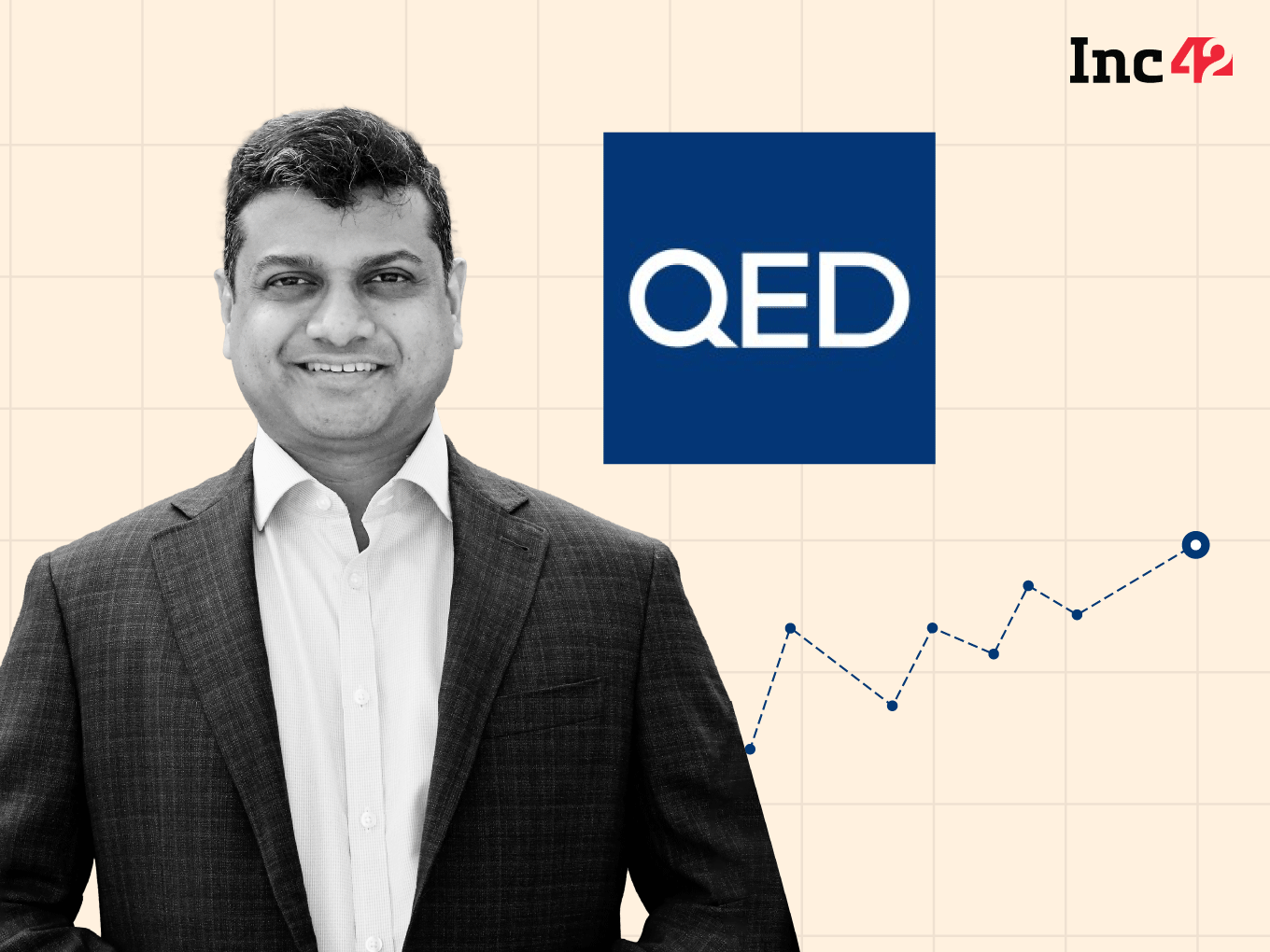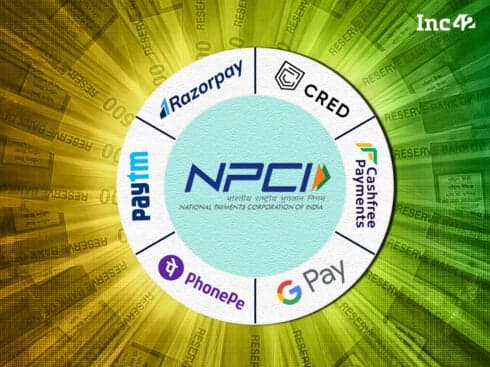We understand the value of regulation, as it provides clarity in future operations. Adhering to regulatory compliance rewards us in winning customer trust: Patil
The investor plans to stay away from brokerages and companies that offer mutual funds, as he is not convinced about the monetisation opportunities in these spaces
Founders need to understand that they are not building a company for a tag. Running after fancy tags, especially with unethical measures, is unwarranted and won’t fetch anything, the investor said
The Government of India last year tightened its noose on the burgeoning fintech sector by notifying new guidelines that deter third-party lending service providers, or non-bank prepaid payment instruments, from extending credit lines. Given the scenario, could this hamper overseas investments into India’s fintech industry?
Sandeep Patil, head Asia and partner at QED
In an exclusive interaction with Inc42, Patil said that the Indian government had earlier laid out its expectations of regulating the financial services industry, so the new guidelines shouldn’t come as a shock.
“If you look at the RBI’s new regulations, 80-90% of these already exist in 2015’s master circular. So, the move is not new. The implementation, however, is stronger than it was before,” the fintech investor added.
QED Investors, which set up its base in India in 2021, has so far invested $150 Mn across various fintech startups in India, including OneCard, Jupiter, Refyne, etc. and has made eight investments across seed to Series D stage startups.
The global VC fund announced its seventh fund in 2021 with a corpus of $1.05 Bn, comprising a $550 Mn early-stage fund and a $500 Mn growth-stage fund to invest in fintech companies across the US, Europe, the UK, Southeast Asia, India, and Africa.
Speaking about RBI’s stance on the burgeoning fintech sector, Patil said that it is definitely attractive from a long-term perspective because it gives more clarity into the dos and don’ts of operating in a specific space. He added that adhering to regulatory compliance helps in winning customer trust.
Here are the edited excerpts…
Inc42: In the wake of regulatory headwinds, especially for the fintech sector, what would be the future strategy of QED Investors?
Sandeep Patil: We continue to be very attracted and excited about the investment opportunities in India. This is because macro factors related to GDP growth rate, emerging middle-class, their ability to invest and borrow, and increasing disposable income put India as one of the rare shining spots in the global economy. India’s macro economy continues to be very strong.
Although we cannot ignore that the sector has been witnessing some regulatory headwind since last year, the fact that the government has laid out its expectations cannot be ignored.
Further, if you look closely at RBI’s regulations, 80-90% of them already exist in 2015’s master circular. So, we cannot call them new regulations; however, the implementation has been much stronger than it was before.
We understand the value of regulation, as it provides clarity in future operations. Adhering to regulatory compliance rewards us in winning customer trust.
It may create short-term disturbances in the market, but it is definitely attractive from a long-tem perspective. This is because we get more clarity into the dos and don’ts of operating in a specific space.
Inc42: Could you give us a quick sneak peek into the investments made since last year? What were some of your biggest bets?
Sandeep Patil: We have made about nine investments in the region since 2020. The investments made in 2022 are yet to be announced.
Inc42: How many deals did you sign in 2022 compared to 2021?
Sandeep Patil: We made two investments in 2020, four investments in 2021 and three in 2022. These are all new investments. In 2021 and 2022, we made new investments in the companies we had invested in 2020.
Inc42: Are you doubling down on your investments?
Sandeep Patil: For One card, we did a Series B funding round in 2020. Then, we concluded a Series C round in 2021 and a Series D round in 2022. In the same year, we made fresh investments in three new companies at the seed level.
Inc42: It seems like some of your portfolio companies like OneCard were impacted by RBI’s lending and PPI guidelines that came out last year, leading to restructuring exercises. What’s your take on it?
Sandeep Patil: Most of the players that got impacted were issuing prepaid debit cards loaded with credit lines. This is what the RBI was against – using debit cards as credit line products. The RBI has been quite clear on its stance, as there are only a few entities that hold the license to issue credit cards in India. This is also clearly mentioned in the RBI’s master circular.
However, in this context, what backfired was that many assumed it was permissible, as there was no RBI action for the last five years.
The idea of giving prepaid cards that came preloaded with extra credit was widely accepted and had scaled. Then, the RBI decided to come down on it heavily, and some companies had to restructure, or restart, their businesses.
As far as OneCard is concerned, it was not much impacted by this shake up, as the founders of the company are ex-bankers and quite aware of the RBI’s regulations and guidelines. They have been dealing with the regulator for a long time now.
It would be hard to believe, but OneCard ended up getting some short-term competitive advantage. Because they were the only ones who continued to operate in the marketplace while other players had to revisit their approach.
Inc42: Which are some of the financial services verticals you are most bullish on?
Sandeep Patil: We are very interested in consumer lending and have a couple of bets in the space. Instead of general lending, we are exploring lending opportunities specific to customer interests.
Then, we continue to bet on insurtech, and I think the regulator has made some very interesting moves in this space.
We have stayed away from brokerages and companies that offer mutual funds, as we are not convinced about the monetisation opportunities in these spaces.
We are also looking to invest in wealthtech companies focussed on unit economics. The last thing worth highlighting is the B2B lending space, but we haven’t done much in this area in India.
With increased focus on Make In India, manufacturing and exports, we see interesting financing opportunities for startups that offer credit facilities to SMEs, supply-chain companies, and exporters.
Inc42: At a time when investments have dried up, especially the big-ticket opportunities, and startups are cutting costs, and let’s not forget the challenges of corporate governance. How have your interactions been with your portfolio companies? How do you see the challenges of corporate governance plaguing Indian startups?
Sandeep Patil: Corporate governance is an area that is gaining more prominence in the industry, and investors are becoming more conscious of it.
If you look at it, startups still lag in corporate governance. This is because they are much smaller companies and pursue ideas that are nebulous to begin with. They often try to figure out if there is a business to be had and then move on to thinking about having greater corporate governance.
In the initial stages, founders are not focussed on corporate governance as they chase growth. Even I have been reluctant to ask founders to fill up corporate governance roles earlyon, as this likely slows down innovation.
You may have a governance setup, but what you should have is founders who respect governance, understand the value of it and have their head and heart in the right place to build a business with high governance and ethical standards.
Further, once you go past Series B, you should have some of the basics in place. Your financials should be tightly audited, you should have clarity in terms of financial control, governance setup, and how to give the right visibility to your board. Founders who give visibility to their board creates a lot more confidence among Investors.
Once you have the first inklings of revenues or profitability coming in, you should proactively set up mechanisms. This will help you demonstrate transparency towards the owners and catch any problems if there are.
If you look globally, these issues are not limited to India. Because the Indian startup ecosystem is budding, such things are expected to cause a lot more stir here compared to more developed economies.
Inc42: Do you think the unicorn fad is over – the strategy of chasing aggressive growth over unit economics and profitability?
Sandeep Patil: Indians have done really well in chasing the unicorn dream. In 2021, the nation was way ahead in minting unicorns compared to its global peers.
Then 2022 came, and despite a slowdown, the hunger among the startups to get the unicorn tag quickly and at all costs kept growing.
However, as a global fund, we can say that the desire to become a unicorn isn’t unique to Indian founders, it is prevalent globally. Being an operator for 20 years, I can understand this desire to be recognised. That is built into the nature of this industry.
Now, whether to pursue that tag at all other costs is at the discretion of founders. This is the area where, I hope, founders realise that these are just fancy tags.
Ultimately, once startups are at mid or late stages, investors look at the basics of their businesses. What have they created? Is their business sustainable, profit making and scalable? Have they actually created an organisation? Or is it just a set of people working towards achieving quarterly numbers? Lastly, is it repeatable?
These are the key things that investors look at, and this is how you get valued. So, if you are doing the right set of things, you don’t need to run behind fancy tags.
Founders need to understand that they are not building a company for a tag. They are building a company for the long term. What is imperative is that you build the business in a sustainable way. Running after tags, especially with unethical measures, is unwarranted and won’t fetch anything.
Update | 18th Feb, 11:40 AM IST
Some parts of the story has been to rectify the years of the investments made by QED.
.svg)





 Fintech
Fintech Travel Tech
Travel Tech Electric Vehicle
Electric Vehicle Health Tech
Health Tech Edtech
Edtech IT
IT Logistics
Logistics Retail
Retail Ecommerce
Ecommerce Startup Ecosystem
Startup Ecosystem Enterprise Tech
Enterprise Tech Clean Tech
Clean Tech Consumer Internet
Consumer Internet Agritech
Agritech

































